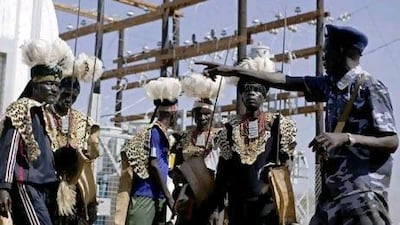In many ways still a jungle, southern Sudan will soon be a nation, and eager entrepreneurs say the vast investment opportunities outweigh the risks.Jason Benham reports from Juba
Braving malarial jungle, cholera epidemics and violence, only the most daring investors have ventured into war-ravaged south Sudan, soon to become an independent nation, but many believe the risks are worth it.
After a north-south civil war that began in 1955 and raged on and off for four decades, the oil-producing south voted in a referendum last month to secede from the north, and an independent country will be born on July 9.
Since the 2005 peace accord that ended the war, the south has had a semi-autonomous government based in the capital of Juba, which has run the region like a separate state.
But with few roads, no electricity grid or real sewer system and running water a luxury - and that's in the main towns - the mostly east African entrepreneurs who hoped to cash in on peace have faced serious obstacles.
"If you make the sacrifice here, there is money to be made. It's virgin territory," says James Berhe, an Eritrean businessman who opened a hotel in Juba in 2008.
"When I arrived here in 2007, this was a jungle. There were three or four hotels, but they were not well organised; there was no air conditioning and accommodation was mostly tents."
Mr Berhe has now finished building a 40-room residential and office block in the centre of the capital, which he plans to rent out. He is also looking into building schools.
Berhane Ghebrehiwot, another Eritrean investor who now runs a hotel on the banks of the Nile, faced similar difficulties when he arrived in the capital.
"I remember when I first came to Juba, I could not even get a $150-a-night tent. They were all full, so I had to sleep in the car.
"So I said a quick prefab would do here," he says.
Violence was also a problem. Many southern Sudanese resented the takeover of trade and business by east Africans, who often brought in foreign staff and took their profits straight out because no tax system is yet in place in the south.
Traders were often attacked by frustrated local people armed with guns, but some say that tendency is subsiding.
"There were attacks, but not recently," says Mamikasolo, a trader from Uganda. "Sometimes they [south Sudanese] are hostile when they buy our goods because they often want a cheaper price. They are still sometimes hostile."
One large investor from the Gulf construction sector was dining in a Nile-side restaurant when a militia group attacked a village just outside of Juba. He left on the next plane.
Juba has been hit by cholera epidemics, visitors almost invariably contract malaria and health care is dire.
But as the fledgling government extends its control, at least over the main towns, investors who persevere have prospered.
Just six years ago, Juba was a government garrison town isolated by rebel forces, with few buildings, one potholed paved road, one hotel and only imported drinking water. The few buildings were in serious disrepair and there was no electricity at night. Goods were flown in from Khartoum.
Now it boasts most of south Sudan's 180 or so small hotels and 10 local water companies, and has a thriving road trade with its east African neighbours.
These days, investors are looking to diversify their portfolios.
Mr Ghebrehiwot wants to expand a farm on the banks of the White Nile, where he already grows vegetables, such as spinach, cucumber and courgettes, on eight hectares of land.
He is considering developing more land to grow produce elsewhere in the fertile south and plans to set up a dairy and fish farm in Juba. But business has not been easy and he has to buy all his essentials in neighbouring Kenya.
"The agriculture is not paying yet - maybe next year," he says. "The soil is acidic, so you have to apply lime, which is imported from Kenya. The transport cost is very high."
Even spare parts for the generators that drive his water pumps have to be trucked in from Kenya. "You cannot even get skilled local technicians," he adds.
But many in Juba expect the future to bring greater stability, now that the split seems headed for a peaceful resolution, even if many problems remain unresolved. Street traders, always sensitive to changes in the economic climate, are returning. "Many of the traders are coming back from Uganda and Kenya," says Milly Malunga, a vegetable trader from Kampala.
Provisional results from the south's referendum show that almost 99 per cent of voters chose independence, and President Omar al-Bashir has said he will support the new state, allaying fears that the north would not let go of the south, where Sudan's main oilfields lie.
The civil war between north and south, fuelled by disputes over oil, ideology, ethnicity and religion, claimed an estimated two million lives and destabilised much of east Africa.
But despite the overwhelming challenges, investors - even from north Sudan - are optimistic that the profits will outweigh the risks given that the south is a nation starting from scratch and with commitments from donors to support its construction.
"Oil and gas ... infrastructure is very lucrative, telecoms is attractive - even basic food and necessities," says El-Fatih Keer, who runs a river transport company trading between north and south, which has invested US$35 million (Dh128.5m).
He says north-south trade will continue even after the south splits away. "Whoever moves in first will be able to reap the profits."
* Reuters

